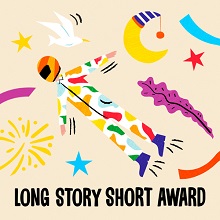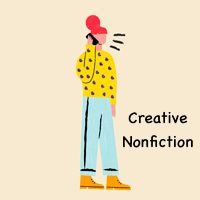Sure, a few of the vowels are missing,but I'm no dummy,though rushing toward the nextinconsequential ... [+]
She was a random roommate who just so happened to live on the other side of the country. I met Shobhita at a science competition sponsored by the Department of Defense in a schmoozy hotel within the glitzy bowels of La Jolla, California. She had a rather violent side part, and the biggest, most expressive eyes I had ever seen. She was smarter than quite anyone else I had ever met.
A year later, I found out that she had borrowed my foundation while I was out of the room. Apparently, Shobhita thought that minimizing her pores might help with her performance nerves. She is Indian-America, and I am Chinese-American. As a result, the foundation most definitely did not match her – not in the slightest, even if you squinted at the foundation bottle under bad bathroom lighting. But in hindsight, this was the first instance of how we began to take care of each other, even inadvertently.
The trope of the letter was originally developed to brave long distances. For Shobhita and I, however, long distance was inevitable. We became accustomed to seeing each others’ faces through the boxed-in frames of video chat. We became best friends not when we were together, but rather when we were apart.
In the glamorous world of international science fairs, Shobhita made me feel brave. I would drag her into the middle of the dance floor - which was packed entirely full of the frenetic energy that could only emanate from science nerds letting loose after days of competitive tension. Come on, I would yell, just fifteen minutes, please? Shobhita may have grumbled here and there, but she would always allow herself to be tugged, until we were facing each other, two silly girls in this cesspool of energy that swirled around us. Limbs dangling in unashamed awkwardness to Despacito, because if there was one thing that was more universal than science, it was Justin Bieber.
Then, we found ourselves assigned to a small double room in the basement floor of a university in the middle of no-where, New York. It was a living situation analogous to a mild form of house arrest. Which, somewhat unsurprisingly, led to a very productive summer of research at summer camp.
In the happy bubble of our co-existence, the largest problems we faced were my apparent snoring and Shobhita’s forgetfulness. She would bribe the program assistants to bring us to the tennis courts. We decided to watch the Lord of the Rings trilogy, and then because we were bored, to watch the Harry Potter series. In between, we ate a lot of vegetarian takeout.
Shobhita and I were trained to be scientists. We looked to explain the world in our own, unique ways. While I took care of plates and plates of stem cells, Shobhita was generating complex protein models on her beat-up Azus Zenbook. Where I saw the sliding filaments of cells, working together to create life, Shobhita saw interconnected networks that could create a more perfect prototype of reality. I was the biologist, and she was the computer scientist. Together, we were two halves of an imperfect brain.
In our shared little bubble, the real world was merely a whisper batting quietly at the ewes of our satisfied co-existence. We were so happy in the naivety that was a high school research camp.
Perhaps by luck, or by strength of self-will, we ended up at colleges down the street from one another – bubbles again, but different. For the first time, now, we no longer saw each other through the constricting box that was video call. We could regularly hug each other. We could meet for food or go shopping for high-heeled shoes. I constantly reminded her to eat three meals a day and to sleep early, and she encouraged me to prioritize my mental health. On a day when the world felt like it was falling apart, Shobhita could Uber to my dormitory at midnight, sitting next to me on the hardwood floor, as she single-handedly steadied the world for me. We, two halves of an imperfect brain, could figure out problems together.
In college, I decided that I wanted to find my future heteronormative soulmate. After the first break-up, I found myself sobbing in front of Shobhita’s dormitory from a mixture of relief and terrified confusion. How good it felt, then, to finally be able to cry. She let me blubber myself to quiet numbness while passersby pretended not to stare, then led me inside to make cornbread.
After the second break-up, Shobhita forced me to get out of bed, even on the bad days. She couldn’t make me consume copious amounts of carbohydrates this time, but she sat with me quietly as the months passed.
Three or four tries later, I thought that perhaps the idea of a heteronormative soulmate was a bit overrated. At that point, too, loss for both of us had been amplified. After all, when your loved ones die, dating no longer remains a high priority.
Grief is a funny thing. We, the two halves of an imperfect brain, found ourselves at a loss to explain it. No amount of neuroscience could make sense of how utterly consuming grief could be. No amount of predictive software could account for the randomness of waking up to bad news on a Saturday morning.
Luckily for us, however, we were inducted as members of the grief club together. Sometimes, we would find ourselves crying over large bowls of overpriced salads – crying, but also almost laughing from the ridiculousness of our salty tears marinating the fibrous stalks of kale. At that point, we had long given up on trying to make sense of it all – science too, all the time, throws out unexpected answers to big questions. What more could we do than to accept things as they came?
Becoming an adult was a hefty thing. Even then, Shobhita continued to make me feel brave.
On the good days, we could go to a local bookstore during the laziness of afternoon sunshine. For a few hours, I would look over and see Shobhita engrossed in a thick historical fiction novel about World War II. We could bury ourselves in the world at large, whether fact or fiction, as people drifted by with their purchases. While we sat with our noses inside our books, the sky outside would change colors, streaking itself with slashes of red-gold. Sometimes, if we looked up at an opportune moment, we could catch those brilliant slashes before they disappeared. Beautiful things were unflinchingly temporary, as it seemed.
A global pandemic tends to throw things into disarray, and so Shobhita and I are at opposite ends of the country once more. For us, however, living in proximity to each other had been an unexpected luxury, rather than a given. We were practiced at the phenomena of being apart.
We make lists for the things that we will do, once we are together again. Just now, I finished talking Shobhita through accepting an offer at a lucrative hedge fund. Perhaps I will not be able to hug her congratulations for quite some time. Regardless, I believe that Shobhita and I will continue, even implicitly, to take care of each other.
Growing up is hard. But she is my person, and I am hers. We, the two halves of an imperfect brain, will continue to be brave, together.



